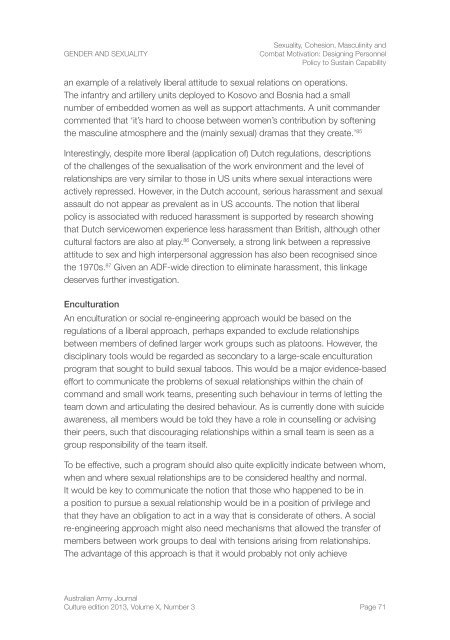Australian Army Journal
Australian Army Journal
Australian Army Journal
Create successful ePaper yourself
Turn your PDF publications into a flip-book with our unique Google optimized e-Paper software.
GENDER AND SEXUALITY<br />
Sexuality, Cohesion, Masculinity and<br />
Combat Motivation: Designing Personnel<br />
Policy to Sustain Capability<br />
an example of a relatively liberal attitude to sexual relations on operations.<br />
The infantry and artillery units deployed to Kosovo and Bosnia had a small<br />
number of embedded women as well as support attachments. A unit commander<br />
commented that ‘it’s hard to choose between women’s contribution by softening<br />
the masculine atmosphere and the (mainly sexual) dramas that they create.’ 85<br />
Interestingly, despite more liberal (application of) Dutch regulations, descriptions<br />
of the challenges of the sexualisation of the work environment and the level of<br />
relationships are very similar to those in US units where sexual interactions were<br />
actively repressed. However, in the Dutch account, serious harassment and sexual<br />
assault do not appear as prevalent as in US accounts. The notion that liberal<br />
policy is associated with reduced harassment is supported by research showing<br />
that Dutch servicewomen experience less harassment than British, although other<br />
cultural factors are also at play. 86 Conversely, a strong link between a repressive<br />
attitude to sex and high interpersonal aggression has also been recognised since<br />
the 1970s. 87 Given an ADF-wide direction to eliminate harassment, this linkage<br />
deserves further investigation.<br />
Enculturation<br />
An enculturation or social re-engineering approach would be based on the<br />
regulations of a liberal approach, perhaps expanded to exclude relationships<br />
between members of defined larger work groups such as platoons. However, the<br />
disciplinary tools would be regarded as secondary to a large-scale enculturation<br />
program that sought to build sexual taboos. This would be a major evidence-based<br />
effort to communicate the problems of sexual relationships within the chain of<br />
command and small work teams, presenting such behaviour in terms of letting the<br />
team down and articulating the desired behaviour. As is currently done with suicide<br />
awareness, all members would be told they have a role in counselling or advising<br />
their peers, such that discouraging relationships within a small team is seen as a<br />
group responsibility of the team itself.<br />
To be effective, such a program should also quite explicitly indicate between whom,<br />
when and where sexual relationships are to be considered healthy and normal.<br />
It would be key to communicate the notion that those who happened to be in<br />
a position to pursue a sexual relationship would be in a position of privilege and<br />
that they have an obligation to act in a way that is considerate of others. A social<br />
re-engineering approach might also need mechanisms that allowed the transfer of<br />
members between work groups to deal with tensions arising from relationships.<br />
The advantage of this approach is that it would probably not only achieve<br />
<strong>Australian</strong> <strong>Army</strong> <strong>Journal</strong><br />
Culture edition 2013, Volume X, Number 3 Page 71

















